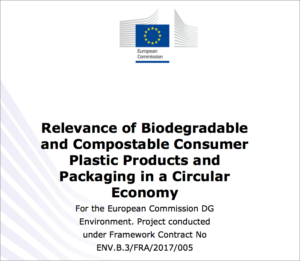 In the course of implementing the European Strategy for Plastics, so far, the European Commission (EC) initiated a remarkable number of research studies. The recently published study on the ‘Relevance of biodegradable and compostable plastic products in a circular economy’ ranks amongst the most important ones for the bioplastics industry. It aims at contributing to the development of criteria for products made from compostable plastics, which provide an agronomic benefit. The study’s findings will serve as a basis for the revision of the Essential Requirements for Packaging as part of the amendment of the EU Packaging and Packaging Waste Directive (PPWD). The study will also contribute to the establishment of a framework for bio-based as well as biodegradable and compostable plastics included in the EC’s new Circular Economy Action Plan.
In the course of implementing the European Strategy for Plastics, so far, the European Commission (EC) initiated a remarkable number of research studies. The recently published study on the ‘Relevance of biodegradable and compostable plastic products in a circular economy’ ranks amongst the most important ones for the bioplastics industry. It aims at contributing to the development of criteria for products made from compostable plastics, which provide an agronomic benefit. The study’s findings will serve as a basis for the revision of the Essential Requirements for Packaging as part of the amendment of the EU Packaging and Packaging Waste Directive (PPWD). The study will also contribute to the establishment of a framework for bio-based as well as biodegradable and compostable plastics included in the EC’s new Circular Economy Action Plan.
Unfortunately, the study has raised great concerns by erroneously stating that ‘evidence is weak in favour of any particular agronomic benefit associated with compostable plastic material in compost and digestate’. It further concludes ‘that material choices for products and packaging should prioritise recyclability over compostability’. Although this core claim is based on wrong grounds and false reasoning, it constitutes a relevant claim from a legal point of view. Because, according to Article 6a.4 of the PPWD, agronomic benefits are a requirement for considering the composting of packaging as a real form of recycling (organic recycling).
The truth is that compostable packaging does provide an agronomic benefit, which is twofold: Firstly, it contributes to the composting process by delivering energy as well as supporting the formation of compost. And, secondly, it is undisputedly proven that compostable packaging, such as lightweight bags, considerably increase the separate collection of organic waste. This enables an improved closure of the nutrient loop and fosters carbon sequestration. In addition, the emission of microplastics into the environment is diminished by reducing the amount of miss-thrown plastic waste typically ending up in organic waste collection.
Amongst other false conclusions, the study also alleges an inadequacy of the standard EN 13432 to actual composting conditions by making a biased reference to exclusively negative examples. While referring to Germany as a worst-case scenario, Italy as an outstandingly positive example is totally neglected. The study is also not in line with the recent study published by Wageningen University & Research, Netherlands, which analysed the fate of compostable packaging products in a full-scale industrial organic waste treatment facility. The results show the tested EN 13432 certified products break down within a maximum of 22 days. It becomes quite obvious that the authors of the study prefer mechanical recycling over organic recycling, clearly discriminating a way of recovery, which is recognized by European law since the approval of the PPWD.
In general, although the study contains findings, which reflect the input provided by European Bioplastics, the overall conclusions often do not reflect these and, on the contrary, contradict 25 years of experience of the sector. As the EC study will serve as an important basis for a framework regulation for biodegradable and compostable plastics, it is important that the document gets reassessed, and the European Commission draws a more fact-based assessment of the sector. This especially applies to the main conclusions drawn from the underlying findings. European Bioplastics is looking forward to an open discussion over the study and its findings and would be able to support the dialogue with according industry data.